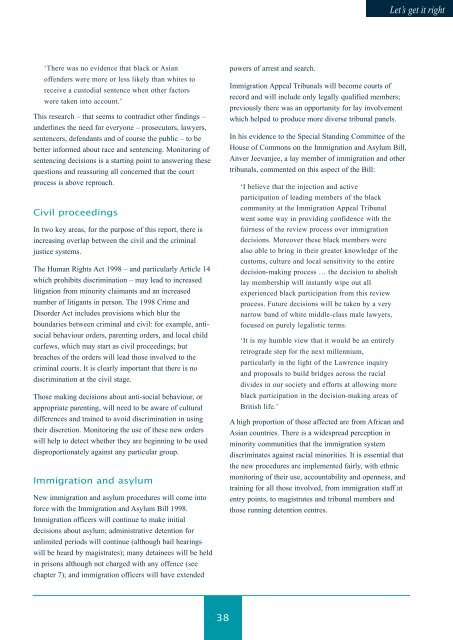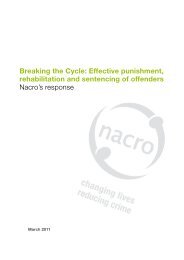Let's get it right: race and justice 2000 - Nacro
Let's get it right: race and justice 2000 - Nacro
Let's get it right: race and justice 2000 - Nacro
- No tags were found...
Create successful ePaper yourself
Turn your PDF publications into a flip-book with our unique Google optimized e-Paper software.
Let’s <strong>get</strong> <strong>it</strong> <strong>right</strong>‘There was no evidence that black or Asianoffenders were more or less likely than wh<strong>it</strong>es toreceive a custodial sentence when other factorswere taken into account.’This research – that seems to contradict other findings –underlines the need for everyone – prosecutors, lawyers,sentencers, defendants <strong>and</strong> of course the public – to bebetter informed about <strong>race</strong> <strong>and</strong> sentencing. Mon<strong>it</strong>oring ofsentencing decisions is a starting point to answering thesequestions <strong>and</strong> reassuring all concerned that the courtprocess is above reproach.Civil proceedingsIn two key areas, for the purpose of this report, there isincreasing overlap between the civil <strong>and</strong> the criminal<strong>justice</strong> systems.The Human Rights Act 1998 – <strong>and</strong> particularly Article 14which prohib<strong>it</strong>s discrimination – may lead to increasedl<strong>it</strong>igation from minor<strong>it</strong>y claimants <strong>and</strong> an increasednumber of l<strong>it</strong>igants in person. The 1998 Crime <strong>and</strong>Disorder Act includes provisions which blur theboundaries between criminal <strong>and</strong> civil: for example, antisocialbehaviour orders, parenting orders, <strong>and</strong> local childcurfews, which may start as civil proceedings; butbreaches of the orders will lead those involved to thecriminal courts. It is clearly important that there is nodiscrimination at the civil stage.Those making decisions about anti-social behaviour, orappropriate parenting, will need to be aware of culturaldifferences <strong>and</strong> trained to avoid discrimination in usingtheir discretion. Mon<strong>it</strong>oring the use of these new orderswill help to detect whether they are beginning to be useddisproportionately against any particular group.Immigration <strong>and</strong> asylumNew immigration <strong>and</strong> asylum procedures will come intoforce w<strong>it</strong>h the Immigration <strong>and</strong> Asylum Bill 1998.Immigration officers will continue to make in<strong>it</strong>ialdecisions about asylum; administrative detention forunlim<strong>it</strong>ed periods will continue (although bail hearingswill be heard by magistrates); many detainees will be heldin prisons although not charged w<strong>it</strong>h any offence (seechapter 7); <strong>and</strong> immigration officers will have extendedpowers of arrest <strong>and</strong> search.Immigration Appeal Tribunals will become courts ofrecord <strong>and</strong> will include only legally qualified members;previously there was an opportun<strong>it</strong>y for lay involvementwhich helped to produce more diverse tribunal panels.In his evidence to the Special St<strong>and</strong>ing Comm<strong>it</strong>tee of theHouse of Commons on the Immigration <strong>and</strong> Asylum Bill,Anver Jeevanjee, a lay member of immigration <strong>and</strong> othertribunals, commented on this aspect of the Bill:‘I believe that the injection <strong>and</strong> activeparticipation of leading members of the blackcommun<strong>it</strong>y at the Immigration Appeal Tribunalwent some way in providing confidence w<strong>it</strong>h thefairness of the review process over immigrationdecisions. Moreover these black members werealso able to bring in their greater knowledge of thecustoms, culture <strong>and</strong> local sens<strong>it</strong>iv<strong>it</strong>y to the entiredecision-making process … the decision to abolishlay membership will instantly wipe out allexperienced black participation from this reviewprocess. Future decisions will be taken by a verynarrow b<strong>and</strong> of wh<strong>it</strong>e middle-class male lawyers,focused on purely legalistic terms.‘It is my humble view that <strong>it</strong> would be an entirelyretrograde step for the next millennium,particularly in the light of the Lawrence inquiry<strong>and</strong> proposals to build bridges across the racialdivides in our society <strong>and</strong> efforts at allowing moreblack participation in the decision-making areas ofBr<strong>it</strong>ish life.’A high proportion of those affected are from African <strong>and</strong>Asian countries. There is a widespread perception inminor<strong>it</strong>y commun<strong>it</strong>ies that the immigration systemdiscriminates against racial minor<strong>it</strong>ies. It is essential thatthe new procedures are implemented fairly, w<strong>it</strong>h ethnicmon<strong>it</strong>oring of their use, accountabil<strong>it</strong>y <strong>and</strong> openness, <strong>and</strong>training for all those involved, from immigration staff atentry points, to magistrates <strong>and</strong> tribunal members <strong>and</strong>those running detention centres.38

















